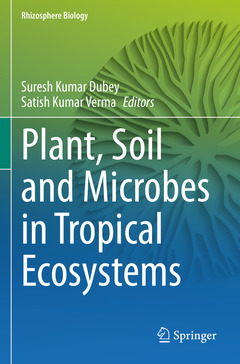Plant, Soil and Microbes in Tropical Ecosystems, 1st ed. 2021 Rhizosphere Biology Series
Coordonnateurs : Dubey Suresh Kumar, Verma Satish Kumar

This book describes the multitude of interactions between plant, soil, and micro-organisms. It emphasizes on how growth and development in plants, starting from seed germination, is heavily influenced by the soil type. It describes the interactions established by plants with soil and inhabitant microbial community. The chapters describe how plants selectively promote certain microorganisms in the rhizospheric ecozone to derive multifarious benefits such as nutrient acquisition and protection from diseases. The diversity of these rhizospheric microbes and their interactions with plants largely depend on plant genotype, soils attributes, and several abiotic and biotic factors.
Most of the studies concerned with plant?microbe interaction are focused on temperate regions, even though the tropical ecosystems are more diverse and need more attention. Therefore, it is crucial to understand how soil type and climatic conditions influence the plant?soil?microbes interaction in the tropics. Considering the significance of the subject, the present volume is designed to cover the most relevant aspects of rhizospheric microbial interactions in tropical ecosystems.
Chapters include aspects related to the diversity of rhizospheric microbes, as well as modern tools and techniques to assess the rhizospheric microbiomes and their functional roles. The book also covers applications of rhizospheric microbes and evaluation of prospects improving agricultural practice and productivity through the use of microbiome technologies.
This book will be extremely interesting to microbiologists, plant biologists, and ecologists.
Chapter 1. Plant- Rhizobacteria Interactions to Induce Biotic and Abiotic Stress Tolerance in Plants.- Chapter 2. Rhizospheric and endophytic microorganisms and their role in alleviation of salinity stress in plants.- Chapter 3. Rhizospheric diversity of cyanobacteria and their significance from tropical ecosystem.- Chapter 4. Cyanobacteria in Rhizosphere: Dynamics, Diversity and Symbiosis.- Chapter 5. Effects of Herbicides on Soil Enzymes and their Regulatory Factors in Agroecosystem: A Review.- Chapter 6. Diversity of Pathogenic Fungi in Agricultural Crops.- Chapter 7. Application of soil microorganisms for agricultural and environmental sustainability: a review.- Chapter 8. Biotic constraints to wheat production in tropics: microbial control strategies and mechanism.- Chapter 9. Phytohormones act as a fundamental regulator in plant-microbe association under stress parameters.- Chapter 10. Use of PGPR to optimize soil and crop productivity under abiotic stress.- Chapter 11. Frame work for studying rhizospheric microflora under the effect of improved crop variety.- Chapter 12. Role of rhizospheric microbes in disease suppression during seedlings formation in millets.- Chapter 13. Metagenomics of plant rhizosphere and endophytic association: concepts and applications.- Chapter 14. Methods of assessments of microbial diversity and their functional role in soil fertility and crop productivity- Chapter 15. Development of biofertilisers and microbial consortium an approach to sustainable agriculture practices.- Chapter 16. Biofertilizers as Microbial Consortium for Sustainability in Agriculture.- Chapter 17. Biofertilizers And Biopesticides: A Whole New Dimension for Ameliorating Soil Fertility and Organic Agriculture Practice.-
Dr. Suresh Kumar Dubey is a professor in the Molecular Ecology Laboratory, Department of Botany, Banaras Hindu University, India. His interests include structure and function of the microbial community involved in controlling methane emission, screening, utilization of microbes for their potential role in bioremediation, and studies on the prevalence of some pathogenic microbes in clinical and food samples and their response to drugs. He has won multiple awards for his work, including Biotech Research Society of India Young Scientist Medal 2004, DST- BOYSCAST Govt. of India fellowship 2006, INSA visiting fellowship 2012 and 2017, and JSPS Invitation fellowship 2012, among others.
Dr. Satish Kumar Verma is an assistant professor in the Department of Botany, Banaras Hindu University, Varanasi, India. He received his Ph.D. in botany (plant microbes) from Banaras Hindu University, Varanasi, India. Dr. Verma also served as assistant professor in the Department of Botany, Visva-Bharti, Santiniketan, India, for about 3 years. Dr. Verma has also visited the Department of Plant Biology, Rutgers University, New Jersey, USA, for a year. He has published 22 research papers in scientific journals of repute, including Microbial Ecology, Symbiosis, Annals of Microbiology, Applied Microbiology, Scientific Reports, Frontiers in Microbiology, Plant and Soil, and Current Science. He has also published six book chapters and edited a book on seed endophytes. His areas of research interest include the functions of plant microbiomes, diversity and ecology, and the roles of microbes in modulation of plant development and protection of hosts from biotic and abiotic stresses.
Describes rhizospheric diversity of microbes and their significance to tropical ecosystems
Covers methods of assessments of microbial diversity as well as their role in soil fertility and crop productivity
Sheds light on the development of microbial consortia and biofertilizers for crops in varied environments, and discusses future prospects and challenges of using soil microbes for sustainable agriculture
Date de parution : 09-2022
Ouvrage de 393 p.
15.5x23.5 cm
Date de parution : 09-2021
Ouvrage de 393 p.
15.5x23.5 cm



